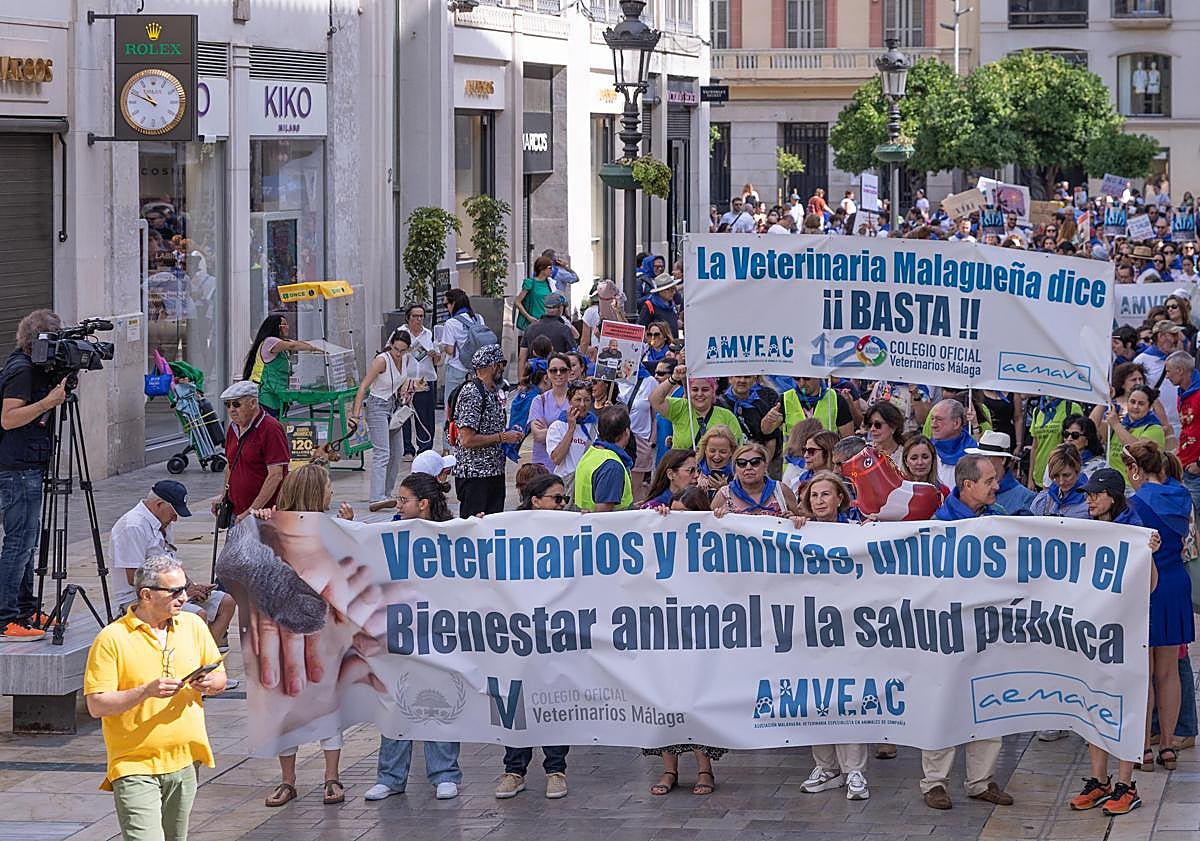Pet owners and vets march in Malaga in protest against Spain's new veterinary medicines law
Professionals in the field of animal healthcare denounced the excessive bureaucracy and the sanctions that do not allow them to apply their expertise and knowledge at work
"I want my health to depend on my owner and my vet, not on an ignorant politician" was one of the slogans at the protest organised by vets and pet owners against the new framework that regulates the prescription of medicines. It was worn by a little dog that took part in the protest on the streets of the Malaga city centre alongside its owner on Saturday, 7 June.
Just a few weeks ago, vets held a symbolic one-hour closure, which was only the beginning of the demonstration at national level held on Saturday, during which doctors received the support of pet owners and animal shelter employees.
The march started from the central Plaza de la Constitución. Banners read 'Vets and families united for animal welfare and public health' and 'Vets tied and gagged equals condemned animals'.



There were a total of 40 demonstrations across the country, under the auspices of the veterinary crisis committee. The participants protested against Royal Decree 666/2023, known as the veterinary medicines law, calling for a fairer and more coherent regulatory framework that allows them to carry out their work in accordance with scientific evidence and professional criteria.
Professional judgement
According to the protesters, the regulation prevents them from directly supplying the necessary treatments to the animals that are taken to their clinics. They also complain that the regulation imposes a disproportionate bureaucratic system on them, requiring "absurd technical details - such as the number of drops administered or the percentage of a cream used - under threat of penalties of up to 1.2 million euros".
All of this, moreover, is based on what they claim to be outdated medication records and outdated protocols. It also results in a delay in getting the right medication for the pet. Even knowing that a compound cures a pathology, if it is not listed in the package leaflet, it cannot be used as a first choice.
In short: they denounce the difficulties that the new regulation creates when they exercise their profession due to issues related to bureaucracy, taxes, the supply of medicines, etc. The committee of vets in Andalucía, in particular, has divided their demands for the regional government and for the central government..
In addition, vets demand that the Ministry of Agriculture, Fisheries and Food reform the law on guarantees and rational use of medicines and health products, in order to allow customers of vet centres and outpatient clinics to receive the medicines they need to complete their animals' treatments on the spot. This would avoid delays, prevent self-medication and promote a more effective fight against antibiotic resistance. They are also demanding the repeal of the requirement to report the prescription and use of antibiotics in companion animals and equines not intended for human consumption, arguing that this information has already been collected since 2023 through the ESUAVet project (European sales and use of antimicrobials for veterinary medicine). In short, they are asking for fewer administrative burdens.
Political fallout
The issue has sparked a political fallout. While left-wing party PSOE and Catalonia's counterpart ERC have announced meetings with health workers, right-wing Partido Popular has issued a harsh statement against the government, which it accuses of promoting a decree without due consensus. The deputy secretary for welfare society, social inclusion, equality and families of the PP in Malaga, Lucia Yeves, joined the march on Saturday. Alongside her were the national MPs María del Mar Vázquez and Gema Pérez, the Andalusian parliamentarian María José Escarcena, and the president of the health forum of the Malaga formation, Enrique Moya. "The decree has put vets on a war footing, because it makes it virtually impossible to comply with the regulations without sacrificing the quality of the health service provided to pets," Yeves stated.
She said that the PP has presented initiatives in various political institutions, to show its support for veterinary professionals and to warn of the disproportionate increase in bureaucracy for the administration of treatments, as well as the increase in administrative pressure. "The sanctions planned are absolutely unaffordable," she said.

-U41522586760PqD-1200x840@Diario%20Sur.jpeg)